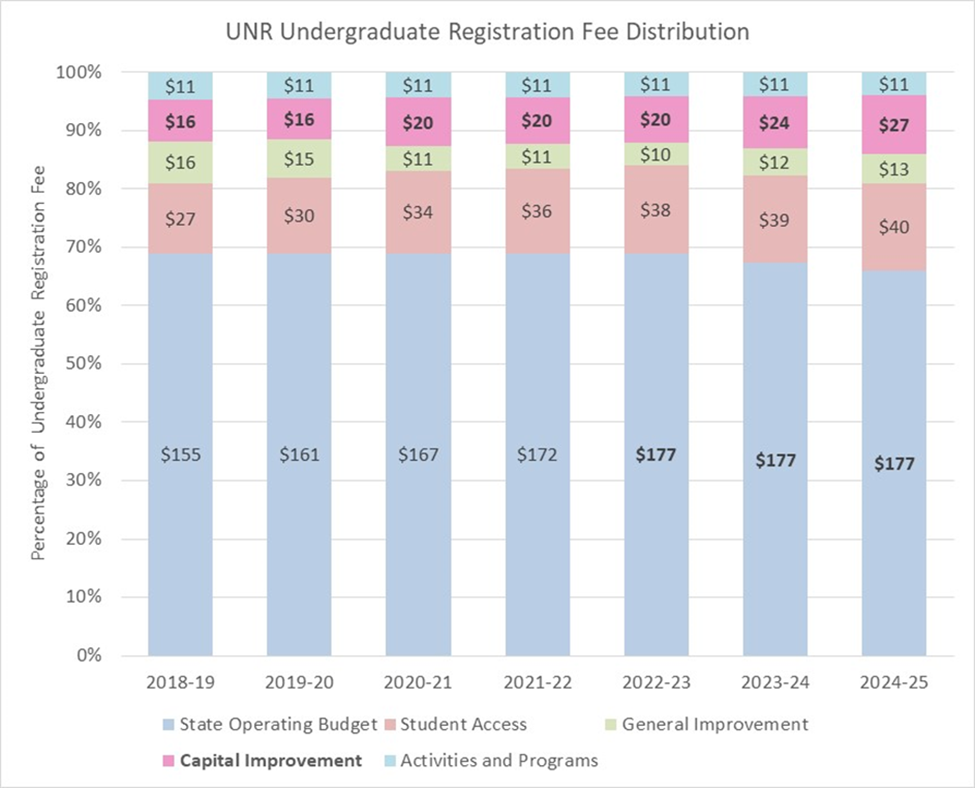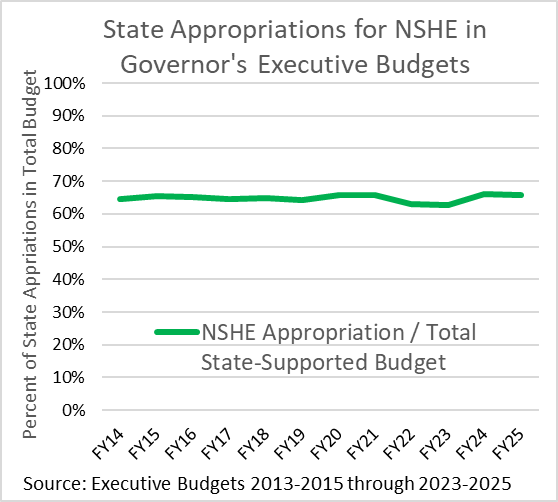UNR Budget: Misplaced Priorities and Diverted Resources
Student Registration Fees Diverted from the State-Supported Operating Budget
Part 4 in a series of articles on the budget situation at UNR. This installment addresses how student registration fees are being spent by the UNR administration.
The distribution of student registration fees at UNR has been shifted from the State Operating Budget into Capital Improvement and General Improvement fees. Specifically, about $3.65 million/year in FY2025 and beyond is being diverted from the core instructional budget into other priorities of the UNR administration. Each $1 million diverted from the operating budget represents about 10 new faculty positions that cannot be filled.
Student Registration Fees
First, we provide some background on the distribution of student registration fees, which are paid by all undergraduate and graduate students on a per-credit basis.
The Regents set the total student registration fees. Since 2019, the annual increase in registration fees has been indexed to the Higher Education Price Index under NSHE’s Predictable Pricing Program. The largest portion of student registration fees funds the State-Supported Operating Budget, UNR’s main instructional budget including instructional and support personnel and all regular academic department and administrative unit operations. Student Access funding for financial aid is mandated by the Board of Regents to be 15% of the overall registration fee for the universities. Smaller portions of the registration fees for General Improvement and Activities & Programs are intended to support programs that enhance the educational or student experience, rather than regular academic and administrative departments. Capital Improvement fees may be used directly for construction or committed to paying off bonds for major building projects.
In each even-numbered calendar year, the Board of Regents approves the distribution of student registration fees into various budget categories (State Operating Budget, Student Access, General Improvement, Capital Improvement, Activities & Programs, and Student Association fees) for the biennium starting in the following odd year.
Shift in Student Registration-Fee Distributions
In May 2022, the Board of Regents approved the registration fee distributions for FY2024 and FY2025. The inflationary increases in the total registration fees were 2.5% for FY2024 and 1.9% for FY2025. Traditionally, the percentage increases for the overall registration fees have been applied to the State Operating Budget category as well, with minor variations for the remaining categories. That would have resulted in a 4.4% increase over the current biennium in the student registration fees supporting the core educational mission.
For the 2023-2025 biennium, however, UNR requested and was granted a 0% change in the portion of registration fees going to the State Operating Budget. Those funds, intended for core instructional activities such as teaching faculty, were distributed instead to Capital Improvement and General Improvement fees. That was a significant departure from past practice, but the Regents did not discuss this shift nor did system or university staff bring it to the public’s attention. As approved by the Board of Regents, therefore, zero additional revenue was dedicated to the teaching of UNR students instead of a inflation-indexed increase of 4.4% over the current biennium, which would have resulted in a $7.86 per credit increase for the State Operating Budget. This diversion of fees represents $3.65 million/year from FY2025 onward diverted from the core instructional budget into other priorities of the UNR administration [1]. Each $1 million diverted from the operating budget represents about 10 new faculty positions that cannot be filled [2].
UNLV also initially requested no inflationary increases for the State Operating Budget registration fees at the May 2022 Regents meeting. However, in response to the higher COLAs approved by the 2023 legislature, UNLV requested in July 2023, a $5.00/credit reallocation from their Capital Improvement fee to the State Operating Budget category. UNR did not request a reallocation.
The diversion of student registration fees from the State Operating Budget diminishes the funding of UNR’s core educational activities. Lower student-fee revenue into the State Operating Budget may ultimately translate into reduced state funding, because the Governor’s Executive Budgets have, since the 2013 legislative session, held state appropriations to a fixed percentage of the total state-allocated budget for NSHE within a narrow range [3].
Trend in Distribution of Student Registration Fees
From FY2019 to FY2025, the overall undergraduate registration fee for university undergraduates as regularly approved by the Board of Regents increased from $224 to $268, a 19% increase. As shown in the chart below, during the same time period UNR:
- Increased the Capital Improvement student fee from $16 to $27 per credit (67% increase)
- Increased the State Operating Budget student fee from $155 to $177 (14% increase)
- Decreased the General Improvement fee for campus-wide student programs from $16 to $13 (17% decrease), although higher than a low of $10 in FY2023.
- The fraction of the undergraduate registration fees allocated to the State-Supported Operating Budget, i.e., core instruction and support, decreased from 69% to 66%.

These values are before the additional 5% increase in student registration fees the Board of Regents approved on December 1, 2023, to assist in funding the 11% COLAs for FY2025. That decision resulted in an increase of $11 per credit ($5.1 million per year for UNR) for the State Operating Budget and $2 per credit ($0.9 million per year) for Student Access.
How Are Auxiliary Student Registration Fees Used?
The expenditure of the General Improvement and Activities & Programs fees is largely discretionary, as they go into separate accounts from the State Operating Budget and are not part of the state budgeting process. NFA submitted a public records request to UNR on December 18, 2023, to discover how revenue from these student fees is being distributed among programs. An update will be provided when available.
A portion of the Capital Improvement fees has been committed to paying off bonds for various buildings. About $5.12 million/year for thirty years has been committed to the Business Building Public–Private Partnership, as will be described in Part 5 of this series.
###
The information in this series of analyses of the UNR budget is based on public reports and records, interpreted as accurately as possible given uncertainties in the assumptions used for various reports. Corrections from authoritative sources are welcome. Contact: kent.ervin@nevadafacultyalliance.org.
_____
[1] Based on FY2023 average annual full-time-equivalent enrollments, each $1.00 per credit increase in student registration fees corresponds to $464,350 in additional revenue.
[2] A UNR Assistant Professor hired at Q1 on the current salary schedule would earn $69,383. Adding the 33.8% fringe rate gives $92,834, or 10.8 positions per million dollars. By the Board of Regents action on December 1, 2023, the salary schedules will be augmented by 10% as of July 1, 2024, giving 9.8 positions per million dollars for future new hires.
[3] The Executive Budgets from FY2014 through FY2025 proposed state appropriations at an average 64.8% of the total state-allocated budget for NSHE overall, with a range of 62.7% to 66.1% and a standard deviation of 1.1%. 2013-2015, 2015-2017, 2017-2019, 2019-2021, 2021-2023, 2023-2025.

Articles in this series: